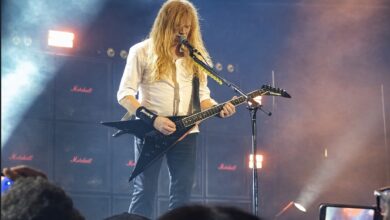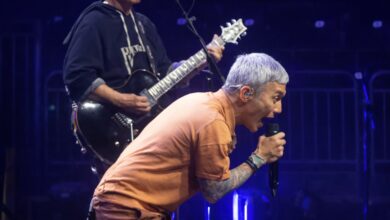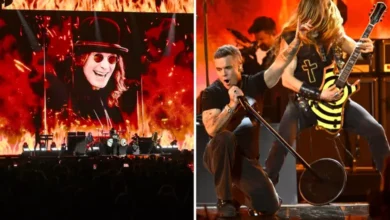Yungblud Breaks Down Performing Ozzy Osbourne’s “Changes” in Luxembourg
The night at Rockhal in Luxembourg began with a sense of restless anticipation. Hours before Yungblud even stepped onstage, fans were already queuing outside the venue, their energy buzzing like static in the air. Some wore smeared eyeliner and torn jackets, others held homemade signs or flags, but all of them had that same spark in their eyes — the look of people who weren’t just there for music, but for belonging.
Inside, the lights glowed dim red as speakers played a soft hum of ambient noise. Conversations turned into chants, and chants turned into rhythmic clapping that rippled through the crowd like waves. People were talking about what the night might bring — some had heard rumors that Yungblud would play “Changes” again, others just wanted to see him back onstage after a string of emotional shows across Europe.
As the hall filled, Rockhal’s signature industrial design — its steel beams, high ceilings, and raw concrete walls — gave everything a cinematic quality. The space seemed to vibrate before the show even began, the hum of thousands of voices creating an atmosphere that felt alive. It wasn’t the calm before the storm; it was the storm holding its breath.
When the house lights finally cut out, the entire hall exploded. A sea of hands rose instantly, and a scream so loud it drowned the opening guitar chord filled the air. Yungblud appeared under a sharp beam of light, dressed in black with his trademark red streak glowing under the stage glow. He didn’t need to say a word — the first few seconds were enough to ignite complete chaos.
The set opened with his signature blend of defiance and vulnerability. He stormed across the stage, pointing to the crowd, jumping, screaming, then stopping suddenly to grin. His voice, raw and unfiltered, echoed through the hall, bouncing off the steel and glass. Every lyric hit harder than it did on record, every drumbeat felt like it was shaking the ground itself.
By the third song, sweat was dripping down his face, and yet his energy didn’t waver for a second. He moved like someone fighting invisible gravity, spinning, kneeling, reaching out toward the audience. The crowd mirrored him — jumping, shouting every word, some crying, some laughing, all completely consumed. It was more than a performance; it was release.
Between songs, he paused to speak, his accent cutting clearly through the noise. He talked about unity, about being misunderstood, about never giving up. The fans roared every time he raised his voice, chanting back in affirmation. He wasn’t just a rock star to them; he was a mirror reflecting their rebellion and resilience.
Then came the shift. The lights softened, the guitars faded into silence, and he took a step forward alone. The mood inside Rockhal changed instantly — from chaos to stillness. People held their breath because they knew what was coming. He looked down for a long moment before the gentle piano introduction to “Changes” began.
The first verse came quiet, fragile, and trembling with emotion. His voice wasn’t the same wild, fearless one from earlier — it was softer, cracked at the edges, but far more powerful in its honesty. You could feel the weight of the tribute in every syllable. The crowd, which had been a roar minutes ago, now stood completely silent, except for a few faint sobs from the front rows.
Halfway through, his voice broke. It wasn’t a dramatic moment for show — it was real, raw, and sudden. He tried to steady himself, holding the microphone close, but the words caught in his throat. He took a deep breath, and the audience instinctively lifted their phones, thousands of tiny lights shimmering back at him like constellations. For a brief second, the entire hall glowed like a sky full of stars.
The band lowered their instruments. He covered his face with one hand, visibly shaken, and whispered something too soft to hear. He looked upward — not as a performance gesture, but as someone speaking to the heavens. It wasn’t about perfection anymore; it was about connection. The silence stretched on, thick with shared emotion.
@guelistan.gndz no one could make me hate you#yungblud #idols #yungbludconcert #luxembourg @yungblud ♬ Originalton – guelistan.gndz
Then, with a faint smile, he managed to continue. The next lines came out shaky but resolute. It wasn’t about hitting every note — it was about finishing what he started. The audience joined him quietly, singing under their breath, as if afraid to interrupt. It became less a concert and more a collective prayer, every person in that room giving something back to the man onstage.
When the final note hung in the air, he didn’t speak. He simply let it fade. Then he looked up once more, eyes glistening, and mouthed a thank-you that carried across the room without a microphone. The applause began slowly, almost hesitant, before erupting into thunderous volume. Some fans were crying openly, others clapping with both hands raised high.
The next few minutes were a blur of sound and light. He wiped his face, smiled faintly, and whispered a final word of gratitude into the mic. “You lot mean the world to me,” he said quietly. It was less a statement, more a confession. The band rejoined him, and the show surged back to life, but something had changed — the energy was no longer wild chaos, but deep connection.
From that point on, every song felt charged with new meaning. The crowd sang louder, not just because they loved the music, but because they had witnessed something real. That kind of vulnerability from an artist — especially one known for fire and rebellion — hits differently. It felt sacred.
By the time the encore arrived, the audience was unstoppable. People on the balcony were leaning over the rails, arms stretched toward the stage. Down in the pit, strangers hugged each other, crying and laughing at the same time. The entire venue pulsed with gratitude and unity. It was no longer just about Yungblud; it was about everyone in the room finding light in darkness together.
The closing moments of the concert were pure catharsis. The lights exploded back into color, and the final chords shook Rockhal’s metal beams. Yungblud screamed, “Luxembourg, I love you!” into the microphone, and the crowd roared it right back at him. He dropped to his knees, head tilted back, eyes closed, breathing hard as the noise filled the air like thunder.
When the lights finally came up, no one moved. People lingered, staring at the empty stage, trying to process what they’d just seen. Conversations started quietly — strangers sharing smiles, tissues, and shaky laughter. The floor was littered with confetti and footprints, the scent of sweat and stage fog still heavy in the air.
Outside, the night was cold and silent. Yet even as the crowd spilled into the streets, the same feeling lingered — that they had witnessed something more than music. It had been grief, gratitude, celebration, and release all rolled into one. For everyone who was there, that night in Luxembourg would remain unforgettable: a collision of rock energy, human fragility, and the kind of emotion that no camera could ever truly capture.





